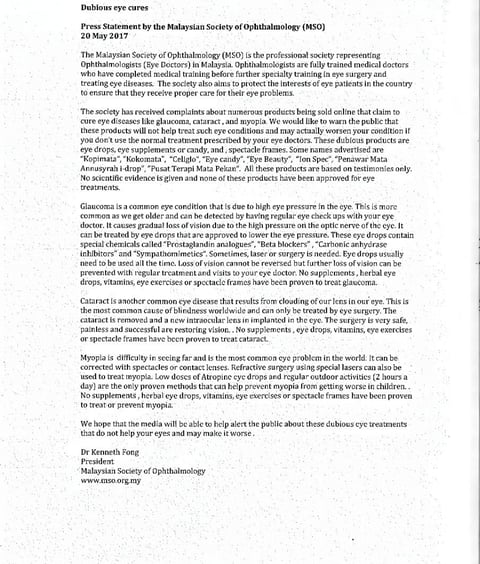The Truth Behind Dubious Eye Drops Claiming to Cure Myopia and Cataracts
2 min read


In today's age of quick fixes and miracle cures, it's not uncommon to come across products that promise astounding results with minimal effort. One such area of concern is the market for eye drops that claim to cure serious eye conditions like myopia, cataracts, and other diseases. As appealing as these claims may sound, the reality is far from what meets the eye.
Understanding the Claims
Many of these eye drops boast impressive benefits such as reversing myopia (nearsightedness), dissolving cataracts without surgery, and even improving overall eye health. They often cite natural ingredients or scientific-sounding jargon to lend credibility to their claims. However, the truth behind these promises is often murky and unsupported by credible medical research.
Why They're Dubious
Lack of Scientific Evidence: The most glaring issue with these products is the absence of rigorous scientific studies backing their efficacy. Genuine medical breakthroughs undergo extensive testing and peer review before being considered safe and effective for public use. Without such evidence, these eye drops remain unproven at best and potentially harmful at worst.
Unregulated Market: Unlike pharmaceuticals, which undergo stringent regulatory processes, many eye drops fall into the category of dietary supplements or cosmetics. This regulatory loophole allows manufacturers to make bold claims without substantiating them through clinical trials or FDA approval.
Potential Health Risks: Using unverified eye drops can pose serious risks to your eye health. Ingredients may be poorly regulated or undisclosed, leading to allergic reactions, infections, or even exacerbation of existing eye conditions.
How to Protect Yourself
Consult a Professional: Before trying any new eye treatment, consult an ophthalmologist or optometrist. These professionals can provide evidence-based advice tailored to your specific eye health needs.
Research Thoroughly: Don't rely solely on marketing claims or testimonials. Look for independent studies published in reputable medical journals or guidance from trusted health organizations.
Check for Red Flags: Be wary of exaggerated claims, undisclosed ingredients, or products marketed as a "miracle cure." If it sounds too good to be true, it probably is.
Choose Trusted Brands: Opt for eye care products from well-known, reputable brands with a history of producing safe and effective treatments. These companies prioritize research and consumer safety over quick profits.
Conclusion
While the allure of quick fixes may be tempting, protecting your vision requires caution and informed decision-making. Dubious eye drops claiming to cure myopia, cataracts, and other eye diseases often exploit vulnerable consumers with unproven claims and potential health risks. By staying informed, consulting professionals, and exercising skepticism, you can safeguard your eye health from misleading products and make choices that prioritize long-term well-being.
Remember, your eyesight is invaluable—don't compromise it for unsubstantiated promises.


